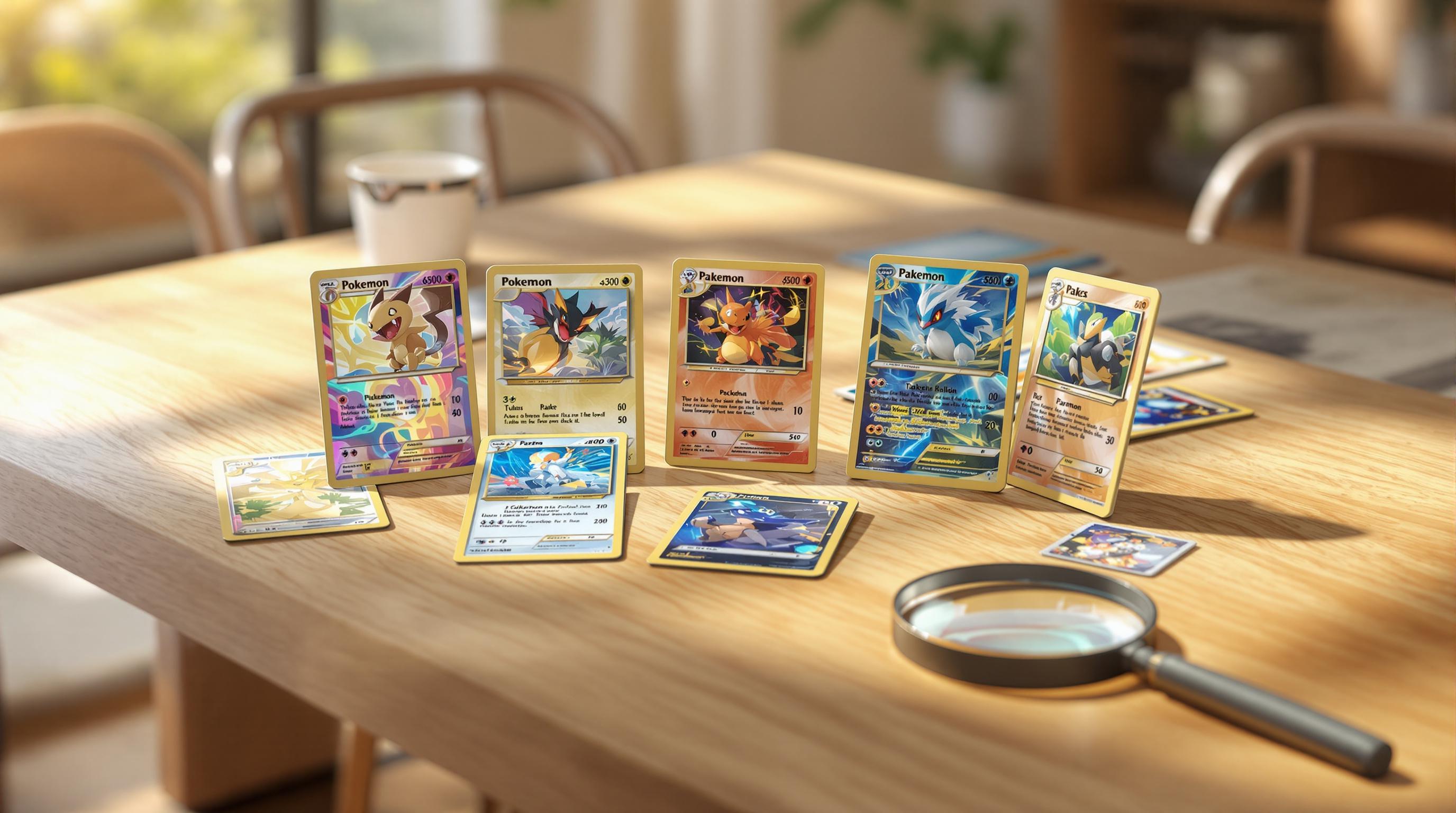Looking for a great Pokemon card shop? Here's what matters most:
- Legitimacy: Business permits, industry memberships, positive reviews
- Card selection: Wide variety of current sets, singles, and rare cards
- Storage conditions: Proper display cases, climate control, careful handling
- Fair pricing: Competitive rates, good trade-in policies
- Extra perks: Grading services, trading events, protection supplies
Quick Comparison of Key Features:
| Feature | Must-Have | Nice-to-Have |
|---|---|---|
| Business permits | ✓ | |
| Wide card selection | ✓ | |
| Competitive pricing | ✓ | |
| Knowledgeable staff | ✓ | |
| Grading services | ✓ | |
| Trading events | ✓ | |
| Vintage cards | ✓ | |
| Online inventory | ✓ |
Remember: Visit shops in person to get the best feel for their offerings and community vibe.
Check if the Store is Legitimate
Want to make sure you're not getting scammed when buying Pokémon cards? Here's how to spot a legit card shop:
Business Permits
Look for these key things:
- Business license on display
- Tax ID number (if required in your area)
- Proper retail zoning permits
Can't see them? Just ask the owner. A real shop has nothing to hide.
Trading Card Group Memberships
Good shops often join big trading card groups. Keep an eye out for:
- Pokémon Organized Play (POP)
- Professional Sports Authenticator (PSA)
- Beckett Grading Services (BGS)
These show the shop cares about industry standards.
Customer Reviews
Do your homework before you buy:
- Check Google and Yelp reviews
- Browse Pokémon TCG forums
- Look at Card Shops List
Focus on what people say about card authenticity, pricing, and customer service.
"Don't just rely on one review. Look at multiple sources. One bad review isn't the end of the world, but if you see lots of complaints about fake cards or crazy prices, watch out!" - Sarah Chen, Pokémon TCG Collector and Tournament Organizer
A real card shop will:
- Have an actual store you can visit
- Be clear about returns and guarantees
- Tell you how they grade and price cards
Don't fall for online-only sellers with no real address. If it seems sketchy, it probably is.
Card Selection
Walking into a Pokémon card shop can be overwhelming. Here's what to look for:
Types of Cards Available
A good shop should have:
- Booster Packs: Latest expansions like Silver Tempest
- Single Cards: For collectors who want specific cards
- Themed Decks: Pre-made decks for quick gameplay
"Buy the cards you want directly instead of chasing them through packs. It's better value in the long run." - Justin Gauthier, Author
This makes sense. A Dragonite GX secret rare from Unified Minds? About $70 as a single. Trying to pull it from booster boxes? You might spend $340.
Old Cards and Foreign Versions
Great shops also stock:
- Vintage Cards: Old can be gold
- Foreign Language Cards: Japanese versions are popular
Some cards can be worth a lot:
| Card | Value Range | Why It's Hot |
|---|---|---|
| Shadowless First Edition Charizard | $3,204 - $50,100 | Super rare, once sold for $420,000 |
| Shining Fates #107 Shiny Charizard VMAX | $97 - $229 | Everyone loves Charizard |
Unopened Product Check
Buying sealed products? Be smart:
- Look for tampered packaging
- Check if factory seals are intact
- Know what should be inside (e.g., Silver Tempest packs have 10 cards, a code card, and an Energy or VSTAR marker)
Card Checking Services
A great Pokémon card shop doesn't just sell cards. They help you spot the real deal. Here's what to look for:
Grading Service Options
Top shops partner with trusted grading companies. Look for these partnerships:
| Grading Service | Key Features | Pricing |
|---|---|---|
| CGC | Expert authentication, Pristine 10 grade, Industry-leading guarantee | Varies by service |
| PSA | Largest grading service, Worldwide trust | Premium 10: $7,999 for items up to $350,000 |
"CGC Cards backs every certified card with a guarantee of authenticity and grade. This makes buying, selling, and collecting cards easier and safer." - CGC Team
Staff Knowledge of Fakes
Good shops have staff who know their stuff. They should spot:
- Blurry images or poor colors
- Text errors and misspellings
- Wrong card backs or energy symbols
Want to test their skills? Ask them to show you the difference between a real card and a fake. It's a great way to learn.
Fake Card Return Rules
Check the shop's fake card policy. A trustworthy store will:
- Have a clear, written return policy
- Give a full refund for proven fakes
- Help verify authenticity if you're unsure
Even experts can miss a fake sometimes. That's why a solid return policy matters.
"TCGplayer always protects you with our Buyer Safeguard." - TCGplayer Team
Good local shops should match or beat this online marketplace standard.
Want to do a quick authenticity check? Try these:
- Hold the card up to light. Real cards have a thin black layer in the middle.
- Look for a holographic image on the back that changes when tilted.
- Check for crisp, clear text and high-quality images.
Shop Conditions
When hunting for a top Pokémon card shop, don't ignore how they handle and display their cards. It can make or break your collecting experience. Here's what to look for:
Card Storage
Good shops take storage seriously. Check for:
- Cool, dry storage areas (not near heat or damp spots)
- Climate control systems or dehumidifiers
"Cool, dry places and acid-free storage boxes are key. Don't stack your cards." - Justin Gauthier, Author
Display Safety
A shop's showcase tells you a lot:
- High-value cards in individual cases or top loaders
- UV-resistant glass to prevent fading
- Locked displays for rare or pricey cards
| Display Type | Good | Not So Good |
|---|---|---|
| Binder sleeves | Great for big collections | Less protection for valuable cards |
| Top loaders | Strong protection | Bulky for large numbers |
| Magnetic cases | Sleek and protective | Pricier option |
Card Handling
Watch how staff handle the cards:
- Clean, dry hands (or gloves)
- Good lighting for careful examination
- Holding cards by the edges
A collector once said:
"Protective sleeves, cases, and careful handling keep your Pokémon cards in good shape and valuable." - Justin Gauthier, Author
Find a shop that nails these conditions, and you're more likely to get pristine cards. It matters whether you're building a deck or preserving value long-term.
sbb-itb-0db97a5
Prices
Understanding a Pokémon card shop's pricing strategy is key. Here's what to look for:
Price Comparison
Good shops offer competitive prices in line with market rates. To get a fair deal:
- Check CardMavin or PriceCharting for price guides
- Look at eBay for current prices
- Find shops using pricing algorithms based on recent sales
"Use a Pokémon card price guide that lists recent prices for popular cards to figure out how much to list them for." - CardMavin Team
Prices can change based on card condition, edition, and rarity. Here's a quick look at pricing tools:
| Resource | Features | Best For |
|---|---|---|
| CardMavin | Quick results by card name and number | Comparing specific card prices |
| PriceCharting | Marketplace and value tracking | Monitoring collection value over time |
| TCGplayer | Price history graphs and multiple listings | In-depth market analysis |
Trade-In Deals
Many shops let you trade in cards. It's a great way to upgrade your collection or get store credit. Look for:
- Clear trade-in policies
- Fair point or credit systems
- Open valuation processes
Some shops use a Trade Calculator for trade-ins. One shop we found uses points:
- 1 point = 1 penny (8000 points = £80)
- Points added to your account within 48 hours
- Unused points stay on your account
When trading in:
1. Sort cards by category
2. Pack cards safely (wrap in stacks of 100)
3. Include your account details
"We check in the cards using the calculator and add points to the customer's account within 48 hours of receiving them." - Pokemon Card Shop Owner
Card condition affects trade-in value. Professional grading can boost a card's worth:
| Card Type | Average Value Increase |
|---|---|
| Graded Cards | 20-50% higher than ungraded |
| PSA 10 Grade | Can be 2-3x more valuable |
Other Shop Features
A top-notch Pokémon card shop isn't just about the cards. Let's look at some extras that can level up your collecting game:
Trading Events
Many shops run regular trading events. It's a great way to grow your collection and meet other fans.
Some shops host weekly tournaments. For example, the TCW Pokemon League runs standard format tournaments with a $5 entry fee.
You might also find charity events. One shop we came across holds Holiday Charity tournaments. The entry? Just bring 5 non-perishable food items. In return, you get an OTS pack and 5 Star Chips.
There are also play days. The Pokémon Trade & Play Event (September 13-15) lets fans play games, swap cards, and hang out.
Mark Thompson, who owns CardMasters in Seattle, says:
"Our weekly tournaments aren't just about winning. They're about building a community and helping players improve their skills."
Here's a quick look at different event types:
| Event Type | Typical Entry Fee | Rewards | Community Value |
|---|---|---|---|
| Weekly Tournament | $5-$10 | Booster packs, store credit | High |
| Charity Event | Donations | Promotional items | Very High |
| Trade & Play Day | Free | Trading opportunities | Medium |
Card Protection Items
Want to keep your cards in mint condition? A good shop should have you covered:
- Sleeves: Come in different sizes and styles. Some even have cool 3D pictures.
- Binders: Great for storing and showing off your collection. Look for ones with Pokémon art.
- Deck Boxes: Perfect for safely carrying your cards to events or a friend's place.
- Playmats: Protect your cards during games and give you a stable surface to play on.
- Locker Boxes: Secure storage with compartments for organizing cards and gear.
Sarah Chen, a collector and tournament organizer, has some advice:
"Invest in quality protection from day one. I've seen too many potentially valuable cards ruined by improper storage. A good sleeve and toploader combo can make all the difference."
Here's a quick guide to protection items:
| Item | Purpose | Recommended For |
|---|---|---|
| Penny Sleeves | Basic protection | All cards |
| Top Loaders | Rigid protection | Valuable cards |
| Binders | Collection display | Set collectors |
| Deck Boxes | Portable storage | Active players |
| Graded Cases | Maximum protection | High-value cards |
A shop with a wide range of these items shows they care about helping you keep your collection in top shape for the long haul.
Shop Comparison Tools
Picking the right Pokémon card shop isn't always easy. Here's how to find your perfect match:
Must-Have vs Nice-to-Have List
What really matters in a card shop? Let's break it down:
| Feature | Must-Have | Nice-to-Have |
|---|---|---|
| Legitimate business permits | ✓ | |
| Wide selection of current cards | ✓ | |
| Competitive pricing | ✓ | |
| Knowledgeable staff | ✓ | |
| Card grading services | ✓ | |
| Trading events | ✓ | |
| Vintage card selection | ✓ | |
| Online inventory | ✓ |
Shop Rating Guide
Want to compare shops like a pro? Here's your game plan:
1. Legitimacy (0-5 points)
Is the shop legit? Look for visible business permits, memberships in trading card groups, and positive customer reviews.
2. Card Selection (0-5 points)
How's their stock? Check for a variety of current sets, single cards, and maybe even some rare or vintage gems.
3. Card Condition and Storage (0-5 points)
Are they treating the cards right? Look for proper display cases, a climate-controlled environment, and staff who handle cards with care.
4. Pricing (0-5 points)
Are you getting a fair deal? Compare prices with online markets, check their trade-in policies, and keep an eye out for sales or promotions.
5. Additional Services (0-5 points)
What else do they offer? Consider card grading options, trading events, and whether they sell card protection items.
To use this guide, visit the shop and score each category. Add up the total (max 25 points) and compare across different shops.
And here's a pro tip: While Card Shops List (cardshopslist.com) can point you to local shops, nothing beats an in-person visit to really get a feel for the place. Happy hunting!
Wrap-Up
Searching for the perfect Pokémon card shop? Here's what to keep in mind:
Legitimacy: Check for business permits and customer reviews. You want a shop you can trust.
Card Selection: A good shop offers variety. One collector puts it this way:
"I appreciate shops that carry a wide range of products. It's impossible to have everything, but a mix of singles, wax, modern, and vintage cards is ideal."
Shop Conditions: Cards need proper care. Look for climate-controlled spaces and staff who handle cards carefully.
Pricing: Compare with online markets and check trade-in policies. Fair prices matter.
Community Focus: Great shops build community. An enthusiast shares:
"My favorite shops host trading events. It's a chance for customers to buy, sell, and trade with each other."
Staff Knowledge: Friendly, knowledgeable staff make a big difference. As one collector notes:
"The best employees get to know you and your interests. They care about you as a person, not just a customer."
Child-Friendly Atmosphere: Shops that welcome kids help grow the hobby. An observer points out:
"Shops that treat children well ensure they'll want to come back. Kids are the future of card collecting."
Keep these points in mind, and you'll find a shop that's not just a store, but a home for your Pokémon card passion.


